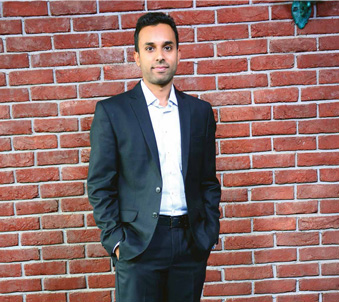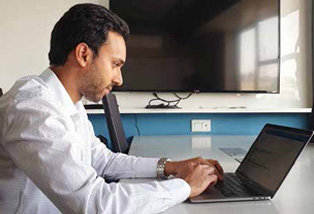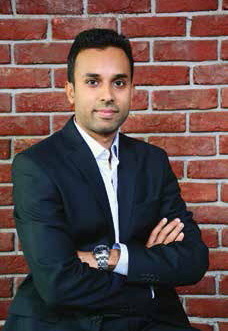From breaking new ground in embedded systems, Kush Mishra, Chief Technology Officer, SenRa, has also developed an enviable breadth of HR knowledge and skills. Having nurtured talented technology teams, he says in order to build a world-class tech company, you need top talent and you have to be willing to pay the price to get it. Hire brilliant tech jerks as well as moderately skilled but excellent team players. Your moon shot should be a mix of the two, says the tech star and guitarist
"Probably one of the easiest ways to promote innovation, which many leaders overlook, is to listen more than instruct. I believe in hiring and nurturing the right talent"

Kush Mishra : A couple of years after my graduation from IIT Roorkee, I left a high-paying secure government job in India’s largest hydropower plant for the smart algorithms division at Bosch (RBEI) for half the salary. Although difficult, the decision was in line with my vision to address common problems using smart solutions and to find a role that can challenge my learning capabilities.
In my first assignment, I developed the algorithm for RBEI’s first mobile application. The application was ranked among the top three solar applications on Apple App Store. Subsequently, several divisions across the company saw the in-house potential and set up dedicated mobile application development teams. Within three months of joining Bosch, I was given an opportunity to lead a strategic project supervised directly by the Bosch Board of Directors. This was my first exposure to IoT back in 2012.
With my patented crash detection algorithm, I led my team to develop an innovative high-tech e-bike device for a Swiss client. Following a positive feedback from the market and a personal demonstration to Bosch CEO, it was decided to integrate the product with the Bosch e-bikes. Soon after, the CEO approved branching out of a separate entity called Bosch Connected Devices and Solutions (BCDS) with a direct investment from the CEO office to handle the $14.4 trillion IoT market for Bosch. I was fast-tracked to a project manager role.
Yes. With BCDS, I spearheaded the software for perhaps the world’s first IoT development kit called Bosch XDK which is doing well in global markets currently. We also worked on creating and stabilizing the IoT software stack from scratch and released other IoT products based on Bosch sensors.
I finished my Bachelors in Electrical Engineering from IIT-R in 2009. The Government job sounded like a good idea during the recession and so the same year I started working in the hydropower plant.
I did my MBA to get out of the tech bubble and build networks. I bootstrapped my first startup Inter Next, right after my MBA from ISB Hyderabad. As a bunch of technocrats, we simply took the biggest problem statements from traditionally stagnant industries like mining and agriculture and tried to solve them with our knowledge in IoT and material science.
We had some initial clients in Saudi Arabia and worked with big conglomerates in India.
Within nine months of working in Saudi, I had two research publications and one patent and a demo-booth at CES Vegas. We worked on cutting edge areas such as wearable sensors and flexible and expandable solid-state electronics.
I started with SenRa back in August 2017 as the Chief Technology Officer. We were the second firm in India to start deployment of public LoRaWAN network. We started with three people and grew from three cities in 2017 to almost 40 cities and several clients today with a team of over 26 people. We see some good years ahead of us. This February, we also launched our application platform, Ginjer, which is an end to end IoT offering to our customers.
Most fathers would disapprove of their children dismantling toy cars to extract DC motor, mine helped me to set up a lab in our vacated apartment instead. I wanted to become a scientist back then. I conducted procedural experiments to understand electricity, fire, color patterns, etc. As I grew up, I found more practical means to quench these curiosities.
I wasn’t the brightest guy at school but I surely was the most inquisitive. When I cracked the IIT entrance exams, I came to realise that hard work can take you places. During my college days, I saw the movie Swades and it stuck with me. After my GMAT, I only targeted for an MBA and a startup in India.
My vision was and still is to set up a truly cutting-edge technology company in India not just an outsourcing services company. I also consider myself lucky to be presented with good opportunities at the right time. Having said that, I think there is no substitute for hard work.
I see my family support as one of the main sources of my motivation to work hard. My parents and my sister are all PhDs and academicians. My brother is also B.Tech. from IIT-R. Academia and hard work comes very naturally to our family. I have seen my parents sweat it out to get to the top and that really set the precedent for me.
I take innovation very seriously. At SenRa, we are on the cusp of bringing in an IoT revolution in India. We are proponents of the latest technology out there that can actually transform people’s lives for the better.
As a principle, we do not wish to engage in price wars by selling outdated technologies and solutions. For this, one of our key strategies is to promote future-proof solutions such as LoRaWAN in India.
For various segments in the IoT industry, the adoption curve might be very different.
For the B2C segment, I see a high PPP growth forecast and consequently, the proposition of the IoT market providing more convenience to our daily lives might be something the Indian consumer will be ready to accept.
The B2B segment is struggling globally as in India to understand the real value of the IoT in terms of the return on investment. The value of IoT lies in the data points that can only be brought in with existing adoption. It’s a catch 22 but I am already seeing great traction at SenRa in our recent successes in this segment.
The B2G segment is very much a policy discussion. I hope the Government continues with its push towards smart city initiatives. Overall, I am very optimistic about the IoT market growth and especially what LoRaWAN can do to revolutionize the IoT industry.
As a network operator, SenRa is well positioned to push the momentum of IoT adoption in India. This is achieved by strategically partnering with device manufacturers from across the globe as well as application or analytics partners to provide an end to end offering to our customers. We also engage with and invested in multiple startups providing innovative solutions to real world problems and have now started to see the results of this push
Probably one of the easiest ways to promote innovation, which many leaders overlook, is to listen more than instruct. I believe in hiring and nurturing the right talent. Instead of assigning my team tasks, I let them choose their tasks freely. I intermittently throw challenging problem statements at them and let them come up with the right answers. And most often they do.
" I wasn’t the brightest guy at school but I surely was the most inquisitive. When I cracked the IIT entrance exams, I came to realize that hard work can take you places"

This is technically my third startup – two of them very well-funded and one bootstrapped – all three are doing well. There is, therefore, a variety of experiences I bring to the table.
At SenRa, I am responsible for all product development initiatives as well as strategic partner ecosystem growth. I bring in 10 years of strong experience in product engineering and management. I have authored multiple research publications in advanced materials and patents in the field of IoT electronics, drones and data-based algorithms. I have rich exposure in embedded hardware and software architecture specializing in IoT/M2M, wireless protocols and LoRaWAN.
I have in the past designed the robust and modular system architecture and easy to use application programming interface. As part of a corporate and a bootstrapped startup, I have also worked on a variety of sensors and RF interfaces such as expertise on electrical signatures and software stacks of embedded MEMS sensors including accelerometer, gyroscope, magnetometer, light, temperature, pressure, humidity and acoustic sensors as well as designed, developed and tested GSM chip integration to enable robust GPRS communication with cloud in weak and strong signal conditions using GSM signal simulation environment.
I have developed GPS, Bluetooth, battery manager and boot loader drivers as well as recruited, mentored and set up training courses for 110+ new recruits, interns and contracted partners.
My failures laid the foundation of my current success as I learned the importance of questioning dogmas, learning by experiments and developing innovative solutions and practices that I have incorporated into my professional pursuits as well. Maybe three important themes come out:
"My failures laid the foundation of my current success as I learned the importance of questioning dogmas, learning by experiments and developing innovative solutions and practices"

There is no innovation under duress! We keep a very friendly atmosphere in the office and have planned the office in a manner that encourages innovation and free thinking. There are free spaces to walk around and mingle. There are no cubicles, it’s an open office. We have given optional desk barriers for people who want to concentrate. There is good music and a good vibe in the office overall.
In general, the work culture could make or break a company. The harsh truth is, depending on the stage of the startup, you might have to adjust to incorporate jerk rock stars as well as moderately skilled but excellent team players. Your moon shot should be a mix of the two.
Most serious crises have often been due to a lack of proper planning. You can always measure the variables that can help control the outcome if you play your cards right and hedge your risks. I am a staunch believer in life is what you make of it.
Always be fair to your colleagues and to your customers. Everyone is taught the same values and principles as a child. So, when you do not obey them within your company or with your customers, you lose the trust factor fast and you set the wrong precedents for your followers.
In a startup environment, work and life have no clear boundaries, but I do try to detach when I can. I try to find time to tour the cities even on work visits. Having travelled to more than 30 countries already, I derive a lot of positive energy from cross-cultural interactions.
Other than that, I love playing my guitar and go rock climbing on weekends or whenever I get a chance. I am also an active speaker at multiple platforms and frequently visit academic institutions to engage with students and faculty as an industry expert.
BY ORCHIE BANDYOPADHYAY